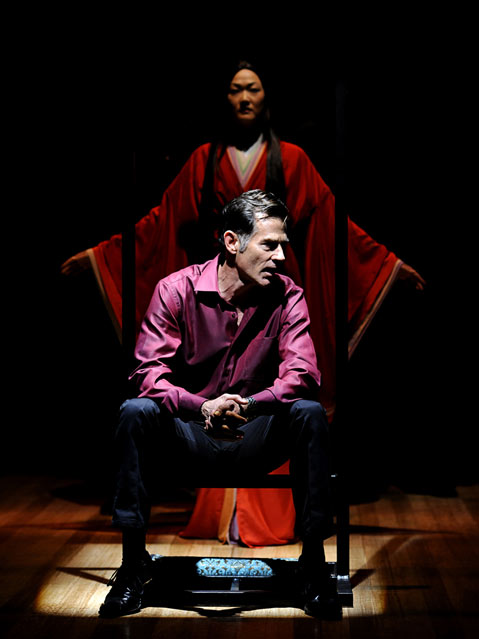Review: 36 Views at PCPA
Playwright Naomi Iizuka Investigates the Art World
This beautifully written and richly suggestive play sets a new standard for the portrayal of the hybrid cultures of the Pacific Rim in the 21st century. Through a skillful mixture of suspense, romance, literary allusion, and aesthetic philosophy, playwright Naomi Iizuka has arrived at a drama that lives up to its title, which aligns the play with a series of woodblock prints by the Japanese artist Hokusai. These images, known collectively as Thirty-six Views of Mount Fuji, include what is perhaps the single most famous image in all of Japanese art, “The Great Wave off Kanagawa.” Like her inspiration, Iizuka is interested in turbulence and in the undersides of great waves, although in her instance the wave in question is cultural rather than aquatic.

Andrew Philpot is excellent as Darius Wheeler, a swashbuckling and unscrupulous dealer in East Asian antiquities. Having made his fortune raiding the Orient like some kind of Indiana Jones, Wheeler provides a fulcrum for the dramatic shift that sweeps through the play’s 36 short scenes, leaving everyone affected in a different place as part of its wake. Jully Lee plays Setsuko Hearn, a rising young star of academic art history and a specialist in 11th-century Japanese literature. When Wheeler’s young assistant, John Bell (George Walker), leaves a fragment of a translation of what appears to be an undiscovered “pillow book” by an anonymous 11th-century woman lying out in the gallery’s offices, the subsequent investigation sends shockwaves through both the scholarly world and the personal lives of the characters.
Leah Anderson plays the clever and resentful young artist Claire Tsong, and Karin Hendricks is Elizabeth Newman-Orr, an investigative reporter. Under Risa Brainin’s sensitive and alert direction, 36 Views manages to be both believable and resonant, a satisfying contemporary mystery and an insightful reflection on the complex legacies of East Asian art and morality in the modern world. The character Setsuko Hearn would appear to be a reference to the legendary Japanese film actress Setsuko Hara, and Jully Lee’s impressive portrayal of this intelligent and passionate woman has to be considered one of the year’s most seductive performances.



